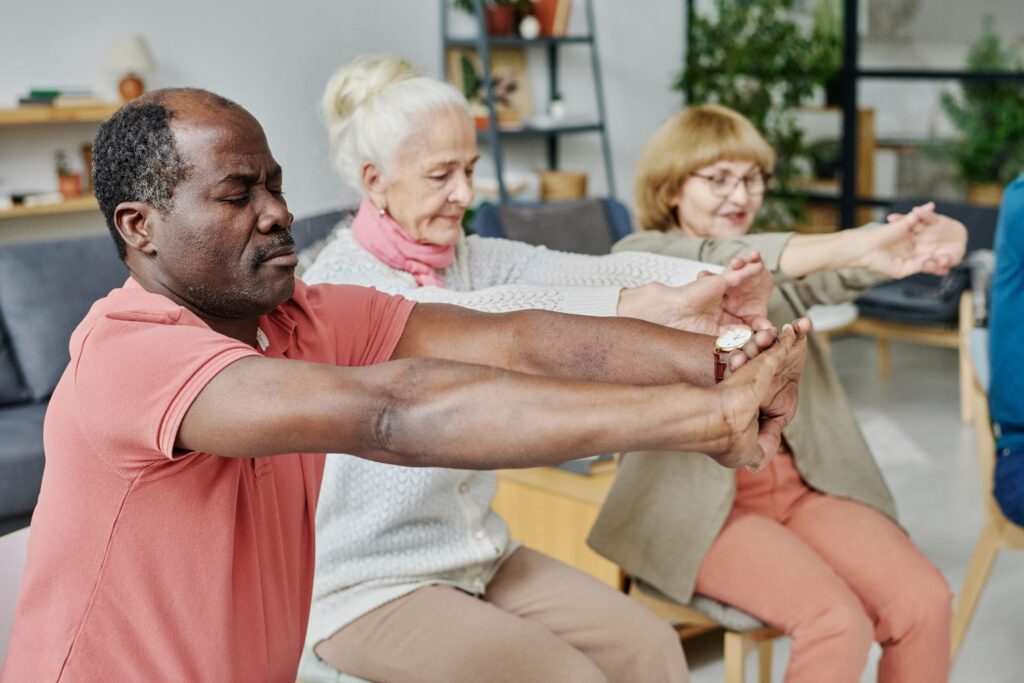Older Adults Can Live Healthy, Active, Social Lives While Reducing Fall Risk
A stumble, a trip, a fall. What may seem like a minor incident may quickly turn serious, especially for older adults. That’s why ThedaCare is sharing tips to help people stay on their feet.
Consider these statistics from the Falls Free Initiative:
- Every second of every day, an older adult (age 65 and older) falls in the U.S.
- More than one-fourth of Americans aged 65 and older fall each year
- Falls result in more than three million injuries treated in emergency departments annually, including over 800,000 hospitalizations and more than 32,000 deaths
- Each year, falls lead to approximately $50 billion spent on medical costs related to non-fatal fall injuries and $754 million spent related to fatal falls
“As the top cause of fatal and non-fatal injuries in older adults, falls are a serious matter,” said Amy Sexton, a ThedaCare Physical Therapist who works at Peabody Manor in Appleton. “The good news is that people can take several steps to help prevent these accidents.”
The seasonal transition from summer to autumn is an opportune time to learn about the importance of taking a proactive approach to avoiding falls, she said.
Why Falls Happen
Age-related changes such as decreased muscle strength, balance issues and declines in vision, hearing and cognition can all increase fall risk. Certain medications – including those for depression, sleep disorders, high blood pressure, diabetes and heart disease – may also cause dizziness or unsteadiness.
Environmental hazards such as poor lighting, loose rugs or clutter in the home, further add to the danger.
The Centers for Disease Control and Prevention cites additional risk factors including:
- Lower-body weakness
- Vitamin D deficiency
- Difficulties with walking and balance
- Foot pain
- Poor footwear
- Excessive alcohol consumption
- Memory loss/dementia
Beyond physical injury, falls can take a heavy emotional toll.
“The fear of falling is real for many older adults,” Sexton said. “That may cause them to shy away from physical activity and social engagements, leading to a decrease in quality of life.”
Avoiding activities may lead to a less active lifestyle, social isolation, depression and feelings of helplessness.
“We want people and their loved ones to know that older adults can live healthy, active, social lives and still reduce their risk of falls,” she said. “Following a few basic tips may help people avoid the possibility of a trip or a fall.”
Steps to Help Reduce Risk
Sexton recommended strategies for fall prevention including:
- Keeping up with routine care. Discuss fall risk, medication side effects and recent falls or near-falls with a health care provider during annual wellness visits.
- Staying active. Activities such as walking, swimming, yoga or tai chi can improve strength, balance and coordination. A physical therapist can help design personalized exercise programs.
- Selecting proper footwear. Wear sturdy, flat shoes with non-slip soles and avoid walking in socks or slippers.
- Safety-proofing the home. Remove tripping hazards, add non-slip mats, improve lighting and install night lights in hallways and bathrooms.
- Using assistive and safety devices. Depending on individual needs, canes, walkers, grab bars, stair rails, shower seats and handheld nozzles can provide added stability and peace of mind. ThedaCare At Home offers a range of assistive and safety devices, as well as the expert guidance of professionals.
“Remaining active and social is crucial to health and well-being as you age,” Sexton said. “Fear of falling shouldn’t get in the way of that. Your doctor and their team are here to help ensure you’re taking all the steps you can to prevent falls.”
Those concerned about trips and falls are encouraged to schedule a visit with a primary care provider or a physical therapist by visiting MyThedaCare.

About ThedaCare
For more than 115 years, ThedaCare® has been improving the health and well-being of the communities it serves in Northeast and Central Wisconsin. The organization delivers care to more than 650,000 residents in 17 counties, and employs approximately 7,000 providers and team members at 180 points of care, including nine hospitals. As an organization committed to being a leader in Population Health, team members are dedicated to empowering people to live their unique, best lives. ThedaCare is a not-for-profit health system with a level II trauma center, comprehensive cancer treatment, stroke and cardiac programs, as well as primary care. ThedaCare also partners with communities to understand needs, find solutions together, and encourage health awareness and action. In 2024, ThedaCare and Froedtert Health combined to form one system to strengthen local health care and provide high-quality services for treatment and prevention in a coordinated manner.
